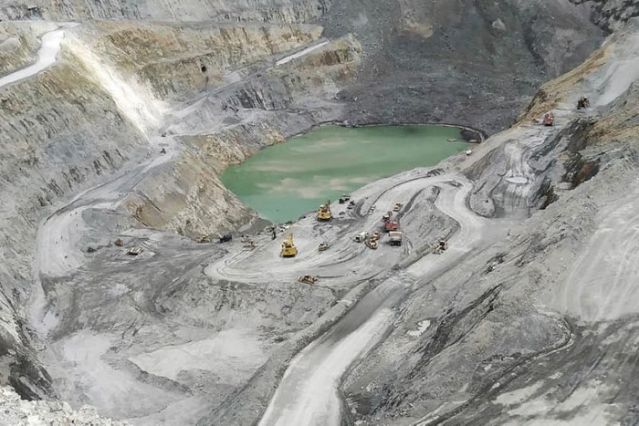Cebu disaster a test of ‘sustainable’ mining vows

File photo | Yahoo! News
ON Tuesday, the Carmen Copper Corp. reported that a large landslide had occurred within its open-pit mine located in Toledo, Cebu, resulting in the death of four workers with six others listed as missing. Although the company and government authorities were careful not to speculate, these other unfortunate individuals were presumably buried in the landslide and also lost their lives, an unimaginable tragedy for their families just ahead of the Christmas holiday.
Carmen Copper, which is an operating mine of Atlas Consolidated Mining Development Corp., announced it was suspending operations, pending the outcome of an investigation by the company and the Mines and Geosciences Bureau (MGB). Besides the Carmen copper mine, one of the country’s largest, Pasay-based Atlas also has a stake in the Berong nickel mine in Palawan.
An initial report from the MGB attributed the landslide to the heavy rainfall experienced by the mine over the past several weeks, including from tropical depression “Vicky” that passed the area last week, which weakened the rock layers and caused them to collapse. MGB Director Wilfredo Moncano also said an earthquake fault in the area of the slide may have also contributed to the accident.
Before Tuesday’s incident, however, the Carmen mine had a relatively good safety record since being acquired and reopened by Atlas in 2007. MGB’s Moncano noted that the mine had passed the Mining Industry Coordinating Council’s (MICC) independent environmental and safety audit earlier this year.
In a separate statement describing the accident as “unfortunate,” the Chamber of Mines of the Philippines (COMP) also stressed the company’s good safety record. “Atlas is known for its strict adherence to the highest safety and health standards. Nevertheless, accidents happen in any industry. This is why the chamber and its members are constantly looking for ways to further improve our safety and health protocols,” COMP said.
The Carmen mine accident is the first major incident since the initiation of a major review of the country’s mining operations was begun by the then Environment secretary, the late Gina Lopez, in 2016, a process of which the MICC audit is a key part, and which is still ongoing. It makes handling of the inquiry into the Carmen accident an extremely delicate matter, and creates an unfortunate situation for the government and the mining industry: The outcome of the investigation and the implementation of any recommendations it produces are not likely to sway any critics of mining to its favor even if the matter is handled professionally and transparently. If the matter is not handled well, of course, if there are perceptions of a whitewash or bending rules to favor mining interests over environmental and community concerns, then it will simply add more fuel to an already burning controversy over mining in the Philippines.
All mining enterprises in the Philippines, the members of COMP, ostensibly adhere to what is called the Towards Sustainable Mining (TSM) initiative, a set of guidelines and best practices developed in Canada and launched in 2004. Its three basic principles of leadership, measured by 23 separate key performance indicators, are community engagement, practicing world-class environmental management, and ensuring the health and safety of mine workers and surrounding communities. The fundamental idea behind the TSM, which we think is sensible, is that recognition of the direct and multiplied economic value of mining must be balanced with recognition that it is an inherently risky activity, both to people and the environment, and that mining resources are finite. Therefore, great care must be taken to maximize their value without imposing negative consequences and costs that may last far into the future.
Building public confidence that mining enterprises are constantly working toward that objective is a herculean task even under the best of circumstances, and incidents such as that which befell the Carmen mine only make that job much more difficult. However, the mining industry and the government have no choice but to do that perfectly. The Philippines is not in a position to simply ignore the economic benefits of mining, but cannot sacrifice its well-being to take advantage of them. The outcome of the investigation into the Carmen mine disaster will tell us much about how well those different needs will be met.
Source: The Manila Times

